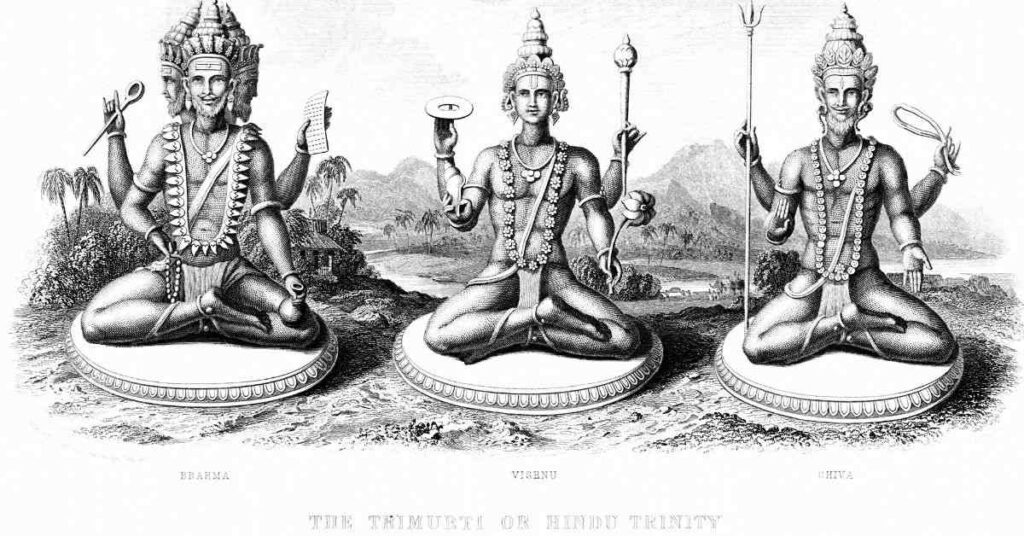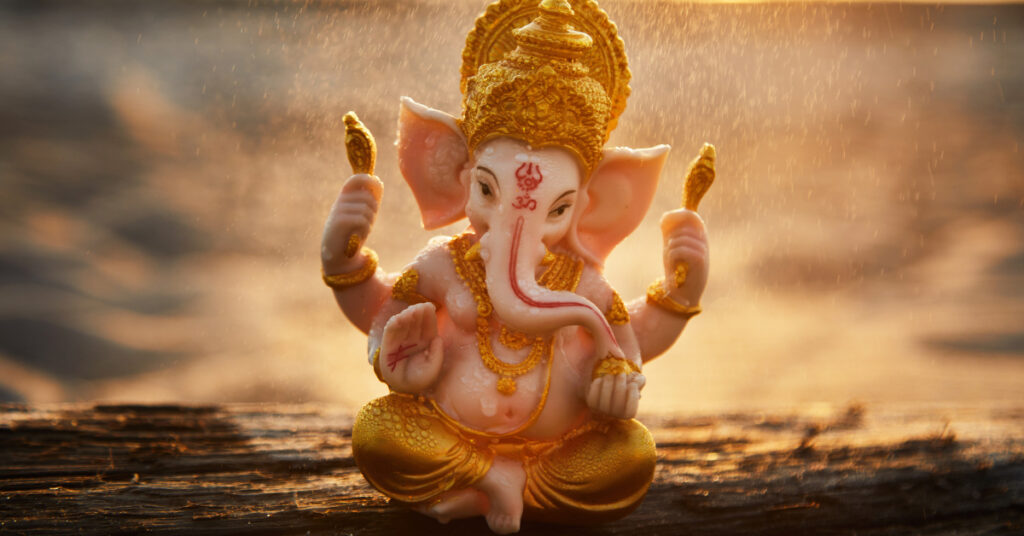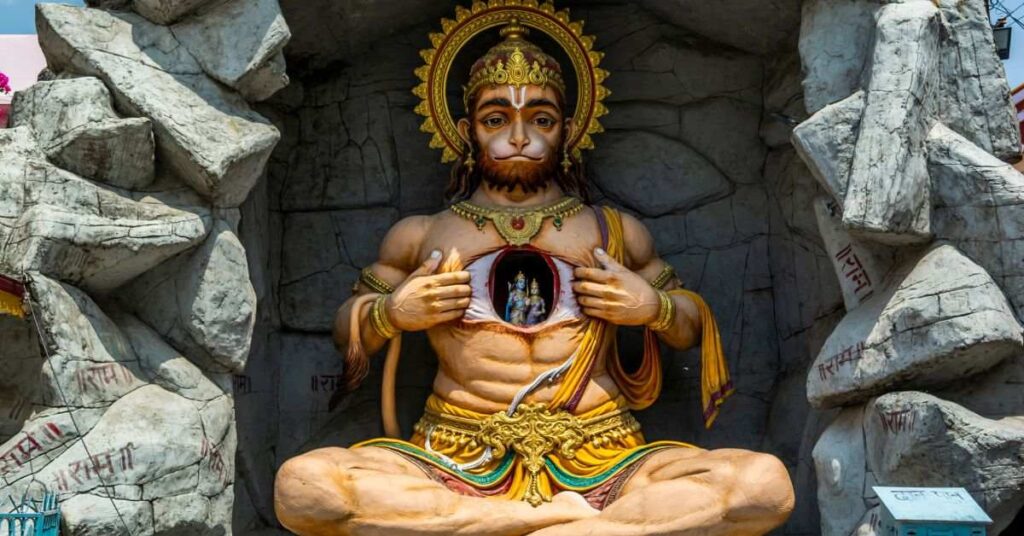Have you ever wondered who is the strongest god in Hinduism? As a polytheistic tradition, there are countless deities revered by followers of the faith.
Each one brings something special and unique to their worshippers, such as protection from harm or prosperity in life and business. But which deity stands out among all others as the most powerful?
Let’s take a look at some of the most notable gods worshipped within Hinduism – Qinmara, Shiva, Vishnu (aka Narayana), Brahma, and Lakshmi – and why they are believed to be so strong.

Introducing the Hindu gods
Hinduism is a rich and diverse religious tradition that has given rise to a multitude of gods and goddesses. Each deity represents a different aspect of the ultimate reality, or Brahman, and is worshipped for specific attributes or qualities.
Some of the most popular Hindu gods include Brahma, the creator; Vishnu, the preserver; and Shiva, the destroyer. Ganesha, the elephant-headed god of wisdom and good fortune, and Hanuman, the monkey god of strength and loyalty, are also widely venerated.
Each god has a fascinating story and distinctive symbolism, making the study of Hindu mythology a deeply rewarding and fascinating pursuit.
Exploring the different gods and their powers
In ancient mythology, gods were found in virtually every culture and region. These powerful beings controlled many aspects of life, from natural phenomena to human emotion.
For instance, the Greek god Zeus oversaw the skies and thunder, while Aphrodite, the goddess of love, could sway the emotions of men and women alike. Despite their differences, most gods were worshipped for their ability to influence the world around them.
Similarly, people sought their favor in hopes of bringing good fortune to their lives. Exploring the various gods and their powers can offer insight into the beliefs and values of different cultures, providing a glimpse into the mysterious ways of the past.
Shiva, the Destroyer of Worlds
Shiva, the Destroyer of Worlds, is a significant deity in Hindu mythology. Known for his destructive force and power, Shiva is often depicted holding a trident and riding a bull.
Despite his terrifying reputation, many Hindus also consider Shiva to be a god of renewal and transformation. One of the most important stories about Shiva involves his dance of destruction, which is believed to pave the way for new beginnings.
As one of India’s most revered gods, Shiva has inspired countless works of art and literature throughout the centuries and remains an important figure in Hindu culture to this day.
In physical strength, lord Hanuman is the strongest one. He is the avatar of lord Shiva. Find why lord Hanuman is called Pawan Putra here.
Lord Vishnu, the Preserver of Creation
Lord Vishnu is a central deity in Hindu mythology, revered as the Preserver of Creation. He is believed to have played a dominant role in shaping the world and maintaining its harmony.
According to Hindu scripture, Vishnu has incarnated in ten different forms (avatars), each with a specific purpose, to protect the world from evil and maintain equilibrium. His most famous avatars include Rama and Krishna.
Vishnu is also known for his compassion and benevolence towards his devotees, whom he is said to protect and guide towards enlightenment. Overall, Lord Vishnu occupies a pivotal role in Hindu cosmology as a source of wisdom, strength, and protection.
Brahma, Creator of All Things
Brahma is considered to be the creator of all things in the Hindu religion. He is one of the Trimurti, along with Vishnu and Shiva. According to Hindu mythology, Brahma emerged from a lotus that sprouted from the navel of Lord Vishnu.
He is depicted as having four faces or heads and sometimes is shown with four hands holding different objects. Brahma is believed to have created the universe, all the living beings, and even the gods.
While he is one of the major gods in Hinduism, he is not worshipped as widely as some of the others. Nonetheless, Brahma remains an important figure in this ancient religion.
Indra, Ruler of the Heavens
Indra, an important figure in Hinduism, is known as the ruler of the heavens. As a deity, he holds great power and is responsible for both the skies and the weather.
Represented with a thunderbolt, he is also the god of war, with many heroic legends associated with his name. Despite his mythological status, Indra remains a significant cultural figure, celebrated in festivals and regarded as a symbol of strength and courage.
His role as a ruler of the heavens gives him important religious significance, as he is seen as a protector of both gods and mortals. Indra’s legacy has endured throughout history and continues to be celebrated today.
Kartikeya, God of War and Victory
Kartikeya, the God of War and Victory, is a prominent figure in Hindu mythology. He is known as the leader of the divine army, and his six heads represent his unique characteristics such as bravery, wisdom, and power.
According to the legend, Kartikeya was born from the spark of Lord Shiva’s third eye, and he was entrusted with the task of defeating the demon Tarakasura. His deeds on the battlefield have made him a symbol of bravery, valor, and victory.
Many devotees seek his blessings for success in battles, both physical and mental. Kartikeya’s impact on Hindu mythology and culture is immense, and his depictions in art and literature continue to inspire people to this day.
Varuna, God of Oceans and Rivers
Varuna is one of the most fascinating deities in Hindu mythology. Known as the god of oceans and rivers, he represents the immense power of water and its ability to both sustain and destroy life.
Varuna’s influence extends beyond the physical realm of water, as he is also believed to be a moral force that governs ethical behavior, justice, and the balance of the universe.
This complex and multifaceted god embodies both the beauty and the danger of the world’s waterways, reminding us of their vital importance and the need for respect and protection.
Ganesha, the Elephant-Headed God
Ganesha, perhaps one of the most recognizable Hindu deities, is often depicted with an elephant head and a round belly. This remarkable figure is believed to embody qualities such as wisdom, intellect, and prosperity.
Ganesha’s physical appearance tells a story in itself: the elephant head is said to represent great physical strength, while the large ears symbolize a deep understanding and attentiveness.
While traditionally worshipped at the beginning of important events or ventures, Ganesha’s teachings encourage individuals to pursue righteousness and overcome obstacles in their path. Through Ganesha’s teachings and guidance, many find inspiration to lead a prosperous and fulfilling life.
Comparing the Powers of Each God
The gods of mythology are an integral part of human history and culture. Each god is said to have unique powers and characteristics that set them apart from one another.
Zeus, for instance, is known for his lightning bolts and role as king of the gods. On the other hand, Poseidon is associated with the sea and earthquakes. The goddess Athena, famous for her wisdom and strategic thinking, is the patron goddess of Athens.
By comparing the powers and traits of these gods, we gain a deeper understanding of the ancient societies that worshipped them and the values they held dear. Examining their feats and abilities offers insight into the cultural beliefs and stories that have been passed down through the generations.
Concluding Remarks – Who is the Strongest Hindu God and Why
In Hindu mythology, there are numerous powerful gods and goddesses worshipped by millions of people around the world. However, the debate about who is the strongest Hindu god has been ongoing for centuries.
Among all the Hindu deities, Lord Shiva is considered the strongest one. He is known for his unbeatable strength, fearlessness, and unparalleled wisdom. Lord Shiva’s strength and power transcend beyond the physical realm, making him the ultimate force to reckon with.
He is also highly respected for his detached persona and unwavering faith, making him a symbol of strength, hope, and eternity for Hindus worldwide. Therefore, it is easy to understand why Lord Shiva is held in such high regard and considered the strongest of all Hindu gods by his followers.
By examining each of the Hindu gods – Shiva, Vishnu, Brahma, Indra, Kartikeya, Varuna, and Ganesha – we have seen that each God holds unique powers. But who is the strongest?
Although deities such as Shiva and Vishnu are powerful in their own right due to their impressive abilities and wide array of divine gifts, it is Lord Brahma whom many name as ‘The Supreme God’ within the Hindu pantheon.
It is said that Lord Brahma created all living beings from his body parts and he has dominion over all other Gods granting him ultimate power.
However, ultimately this is down to personal perspective; to truly understand which Hindu god wields the greatest power you need to first embark on a spiritual journey exploring as many facets of legions of diverse Gods that together make up the diverse complexities of what is known as Hinduism. Why not take this opportunity to learn more about these interesting figures and gain insights into their wonderful mythology?


